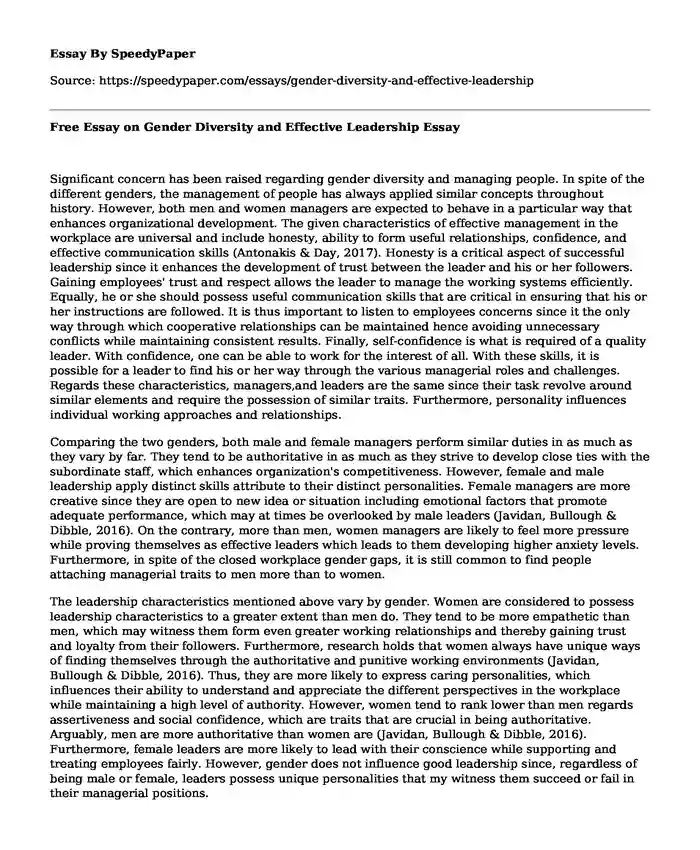
| Type of paper: | Essay |
| Categories: | Leadership analysis Gender Diversity |
| Pages: | 3 |
| Wordcount: | 740 words |
Significant concern has been raised regarding gender diversity and managing people. In spite of the different genders, the management of people has always applied similar concepts throughout history. However, both men and women managers are expected to behave in a particular way that enhances organizational development. The given characteristics of effective management in the workplace are universal and include honesty, ability to form useful relationships, confidence, and effective communication skills (Antonakis & Day, 2017). Honesty is a critical aspect of successful leadership since it enhances the development of trust between the leader and his or her followers. Gaining employees' trust and respect allows the leader to manage the working systems efficiently. Equally, he or she should possess useful communication skills that are critical in ensuring that his or her instructions are followed. It is thus important to listen to employees concerns since it the only way through which cooperative relationships can be maintained hence avoiding unnecessary conflicts while maintaining consistent results. Finally, self-confidence is what is required of a quality leader. With confidence, one can be able to work for the interest of all. With these skills, it is possible for a leader to find his or her way through the various managerial roles and challenges. Regards these characteristics, managers,and leaders are the same since their task revolve around similar elements and require the possession of similar traits. Furthermore, personality influences individual working approaches and relationships.
Comparing the two genders, both male and female managers perform similar duties in as much as they vary by far. They tend to be authoritative in as much as they strive to develop close ties with the subordinate staff, which enhances organization's competitiveness. However, female and male leadership apply distinct skills attribute to their distinct personalities. Female managers are more creative since they are open to new idea or situation including emotional factors that promote adequate performance, which may at times be overlooked by male leaders (Javidan, Bullough & Dibble, 2016). On the contrary, more than men, women managers are likely to feel more pressure while proving themselves as effective leaders which leads to them developing higher anxiety levels. Furthermore, in spite of the closed workplace gender gaps, it is still common to find people attaching managerial traits to men more than to women.
The leadership characteristics mentioned above vary by gender. Women are considered to possess leadership characteristics to a greater extent than men do. They tend to be more empathetic than men, which may witness them form even greater working relationships and thereby gaining trust and loyalty from their followers. Furthermore, research holds that women always have unique ways of finding themselves through the authoritative and punitive working environments (Javidan, Bullough & Dibble, 2016). Thus, they are more likely to express caring personalities, which influences their ability to understand and appreciate the different perspectives in the workplace while maintaining a high level of authority. However, women tend to rank lower than men regards assertiveness and social confidence, which are traits that are crucial in being authoritative. Arguably, men are more authoritative than women are (Javidan, Bullough & Dibble, 2016). Furthermore, female leaders are more likely to lead with their conscience while supporting and treating employees fairly. However, gender does not influence good leadership since, regardless of being male or female, leaders possess unique personalities that my witness them succeed or fail in their managerial positions.
Finally, successful leadership is significantly determined by an organization's culture. Thus, possessing the traits essential for any leadership position is just but one of the many aspects that determine the success of a business. The prevailing culture may influence the leader's ability to run the organization efficiently. Arguably, both the values, norms and practice of a given enterprise pose diverse challenges to leaders since the way they want things to be done may contradict the traditions of the given setting (Muenjohn & Armstrong, 2015). One has to adjust their leadership traits to meet the concerns of the majority including setting goals that align with the organization's culture. Thus, effective leadership cannot prevail in an organization that observes the wrong culture.
References
Antonakis, J., & Day, D. V. (Eds.). (2017). The nature of leadership. Sage publications.
Javidan, M., Bullough, A., & Dibble, R. (2016). Mind the gap: Gender differences in global leadership self-efficacies. The Academy of Management Perspectives, 30(1), 59-73.
Muenjohn, N., & Armstrong, A. (2015). Transformational leadership: The influence of culture on the leadership behaviors of expatriate managers. International Journal of Business and information, 2(2).
Cite this page
Free Essay on Gender Diversity and Effective Leadership. (2022, Jun 16). Retrieved from https://speedypaper.com/essays/gender-diversity-and-effective-leadership
Request Removal
If you are the original author of this essay and no longer wish to have it published on the SpeedyPaper website, please click below to request its removal:
- Essay Example on Imprisoned Elderly Males
- Free Essay Explaining How Punctuality and Attendance Relates to Character
- Importance of NCAA - Free Essay Example
- Free Essay about the Marijuana Debate
- Accounting Analysis Essay Sample
- Description of the patient's current status
- Paper Example on Combating Cardiovascular Changes in Aging: A Proposal for Prevention and Management
Popular categories




